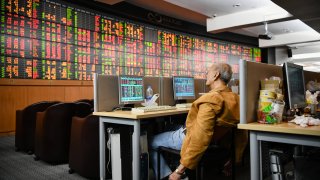
- Asia-Pacific markets traded mixed on Friday as investors remained cautious over the short-term economic impact of the coronavirus as cases around the world continue to rise.
- Sentiment on Wall Street received a boost after lawmakers agreed to resume negotiations over a potential new Covid-19 relief bill.
- The coronavirus pandemic, which has infected more than 56 million people and caused major disruptions to the world economy, has also pushed global debt levels to a new high.
SINGAPORE — Asia-Pacific markets traded mixed on Friday as investors remained cautious over the short-term economic impact of the coronavirus as cases around the world continue to rise.
Australia's benchmark ASX 200 slipped 0.12% to 6,539.20. The heavily-weighted financials subindex finished up 0.22% while materials and energy sectors struggled for gains.
The Nikkei 225 index in Japan fell 0.42% to 25,527.37 while the Topix index finished fractionally higher at 1,727.39. South Korea's Kospi index gained 0.24% to 2,553.50.
Data from Japan showed core consumer prices fell in October at their fastest pace annually in nearly a decade, raising deflation fears in an economy that is still grappling with the pandemic. The country's factory activity decline also sped up in November.
On the Chinese mainland, the Shanghai composite rose 0.44% to 3,377.73, the Shenzhen composite was up 0.6% at 2,289.51 and the Shenzhen component added 0.54% to 13,852.42. In Hong Kong, the Hang Seng index gained 0.33% in late afternoon trade.
China kept its lending benchmark loan prime rate steady for the 7th straight month, in line with market expectations. The one-year rate was kept unchanged at 3.85% and the five-year rate remained at 4.65%, Reuters reported.
Money Report
Markets remain cautious
The session in Asia followed a tepid finish overnight where U.S. stocks closed slightly higher as traders increased their exposure to major technology names. Sentiment on Wall Street received a boost after lawmakers agreed to resume negotiations over a potential new Covid-19 relief bill. Still, U.S. futures fell in overnight trading.
"Markets remain cautious, balancing a very positive medium-term outlook on well-founded vaccine hopes, against the current resurgence of the virus which has seen a number of new restrictions being imposed in the US," said Tapas Strickland, director of economics and markets at the National Australia Bank, in a morning note.
The coronavirus pandemic, which has infected more than 56 million people and caused major disruptions to the world economy, has also pushed global debt levels to a new high. The Institute for International Finance said global debt levels rose over $272 trillion in the third quarter and was expected to reach $277 trillion by the end of the year, representing a debt-to-GDP ratio of 365%.
In Europe, there is growing worry that a $2 trillion stimulus plan will not be delivered as quickly as planned after tweaks made to the deal last month was opposed by Hungary and Poland. Brexit negotiations have also been suspended after reports said an EU negotiator tested positive for the coronavirus.
"A lack of agreement on fiscal stimulus in the US and Europe reduces the likelihood of economic stimulus from this channel putting more pressure on central banks to deliver," said Kishti Sen, an economist at ANZ, in a morning note.
Elsewhere, China's interbank bond market regulator said it will launch a probe into three banks — Industrial Bank, China Everbright Bank and Zhongyuan Bank — after a shock bond default last week by state-owned coal miner Yongcheng Coal & Electricity Holding Group, Reuters reported.
The three banks were said to have helped the company issue bonds and on Nov. 10, Yongcheng defaulted on a 1 billion yuan ($151.84 million) bond, Reuters said.
A series of high-profile defaults from state-owned enterprises have left investors rattled and sparked a selloff in the Chinese corporate debt market last week.
Currencies and oil
The dollar index, which measures the U.S. dollar against a basket of its peers, last traded at 92.213, declining from an earlier high of 92.346. The index retreated from levels near 93.00 in the previous week.
Analysts have said the dollar is caught between optimism surrounding promising vaccine news and the rapid rise in coronavirus cases around the world which has forced countries to reimplement localized shutdowns.
The Japanese yen weakened traded at 103.76 against the dollar compared to an earlier level of 103.90. Meanwhile, the Australian dollar changed hands at $0.7298, climbing from an earlier low of $0.7264.
Oil prices traded mixed on Friday during Asian hours. U.S. crude was down 0.1% at $41.70 while global benchmark Brent traded up 0.11% at $44.25 a barrel.
Subscribe to CNBC PRO to access live PRO Talks live, including our Dec. 2 discussion on opportunities and risks in international markets.






